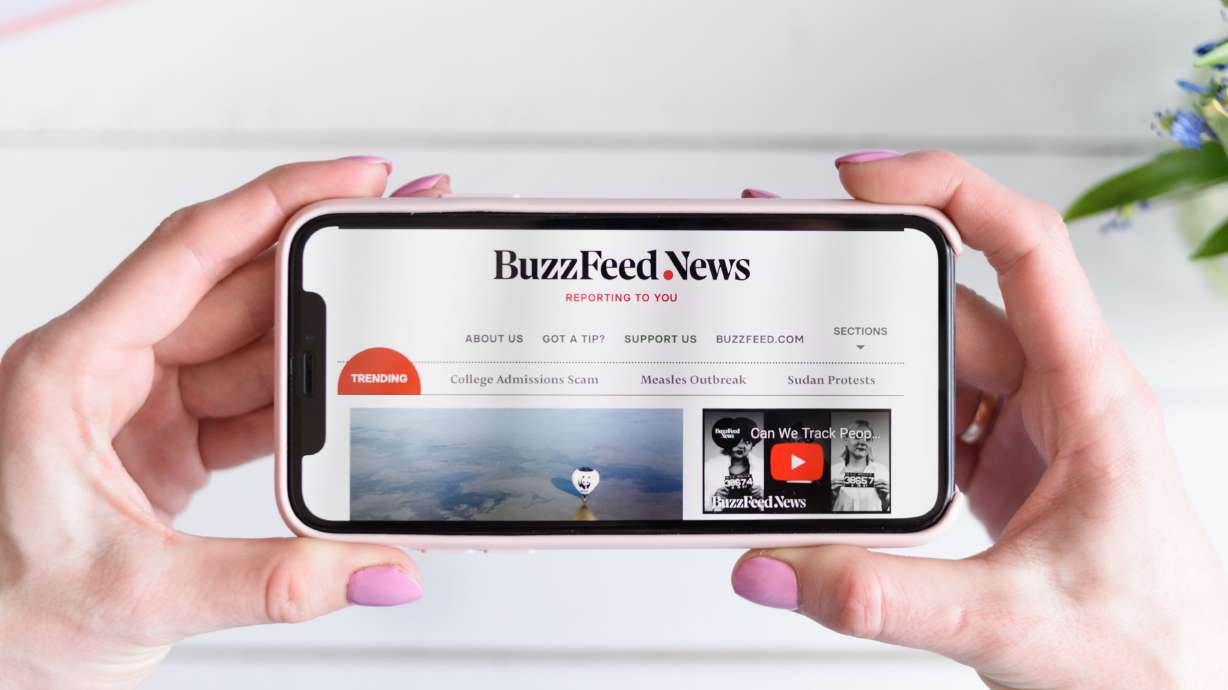Estimated read time: 4-5 minutes
This archived news story is available only for your personal, non-commercial use. Information in the story may be outdated or superseded by additional information. Reading or replaying the story in its archived form does not constitute a republication of the story.
NEW YORK — Last month, Buzzfeed announced plans to cut its workforce by 12% in an effort to rein in costs as the company's stock value continued its downward spiral since going public in 2021.
But a newly revealed partnership that will bring a very smart, albeit inanimate, content creator into the fold, has sent Buzzfeed's stock on a tear, with the share price up over 300% in the last two days.
On Thursday, the website, best known for its listicles and quizzes, announced plans to adopt artificial intelligence technology developed by ChatGPT creator OpenAI to enhance both content and user experience, according to a memo to Buzzfeed employees from company CEO Jonah Peretti.
"In 2023, you'll see AI-inspired content move from an R&D stage to part of our core business, enhancing the quiz experience, informing our brainstorming, and personalizing our content for our audience," Peretti wrote in the memo, according to Reuters.
Peretti told employees he believes the algorithmic approach of optimizing content for users is set to be replaced by new tools based on emerging artificial intelligence capabilities.
"If the past 15 years of the internet have been defined by algorithmic feeds that curate and recommend content, the next 15 years will be defined by AI and data helping create, personalize and animate the content itself," Peretti wrote to employees, according to Variety.
Peretti appears to have taken great care in drawing a line between "creation" and "inspiration" in his note to employees when it comes to what role OpenAI's artificial intelligence engine will play in Buzzfeed's future.
"To be clear, we see the breakthroughs in AI opening up a new era of creativity that will allow humans to harness creativity in new ways with endless opportunities and applications for good," Peretti wrote. "In publishing, AI can benefit both content creators and audiences, inspiring new ideas and inviting audience members to co-create personalized content."
The pitfalls of AI-created content were recently brought into sharp focus through an experiment run by technology publication CNET after a series of articles generated in part by an artificial intelligence tool, developed by CNET programmers, ran amok. Issues included factual errors, plagiarism and allegations that CNET failed to clearly indicate which stories it ran were authored by a computer program.
In a mea culpa story published earlier this week and authored by CNET editor-in-chief Connie Guglielmo, CNET said the AI story writing effort, which launched in November, was on temporary hold. Guglielmo wrote that CNET had conducted an audit on all 77 AI-generated stories and issued corrections, some of them "substantial" but she did not indicate how many of the stories required revisions.
Per CNN, the disclosure comes after Futurism reported earlier this month that CNET was quietly using AI to write articles and later found errors in one of those posts. While using AI to automate news stories is not new — the Associated Press began doing so nearly a decade ago — the issue has gained new attention amid the rise of ChatGPT, the viral new AI chatbot from Buzzfeed partner OpenAI that can quickly generate essays, stories and song lyrics in response to user prompts.
Buzzfeed has clarified that it will not be using ChatGPT, per se, in its new content plan but will instead be plugging into OpenAI's artificial intelligence processing via application program interfaces.
ChatGPT is part of a new generation of AI systems that can converse and generate readable text on demand based on what they've learned from a vast database of digital books, online writings and other media, per the Associated Press.
Unlike a search engine response to a question, which simply points you to the answer where it already lives on the internet, ChatGPT generates its own original answers based on all the information it has already ingested and assessed. Thus, while Google isn't going to help you write a sonnet in the style of, say, Hunter S. Thompson, ChatGPT will easily churn that out for you in just a matter of moments.
What's driving all the hubbub now is that while ChatGPT is just the latest iteration of a series of AI system releases from OpenAI, it's the first one that's been publicly available — and free.
In a Monday blog post, Microsoft announced a third phase of the company's "long-term partnership with OpenAI through a multiyear, multibillion-dollar investment to accelerate AI breakthroughs to ensure these benefits are broadly shared with the world."
The latest funding commitment follows two previous rounds of Microsoft investment in OpenAI, a startup co-founded by Sam Altman, Tesla/SpaceX CEO Elon Musk and others in 2015. Per the announcement, Microsoft will also be able to incorporate OpenAI's artificial intelligence advancements into its own new and/or existing products.









